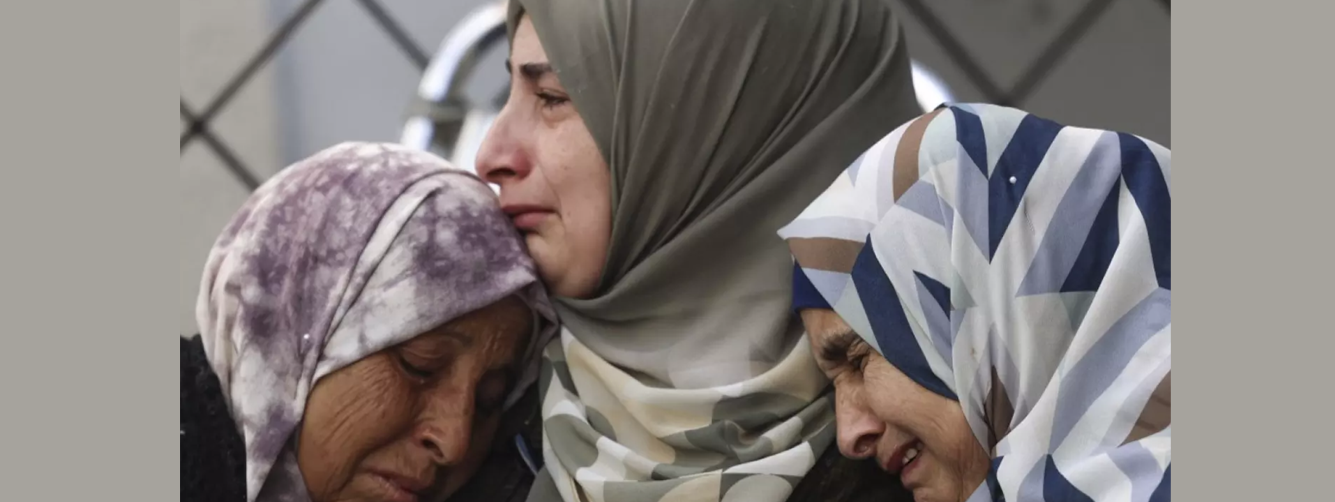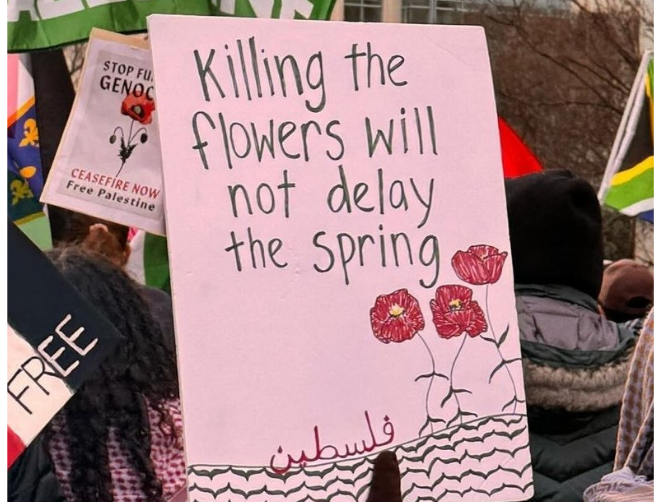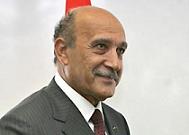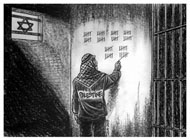“We feel great remorse for every single citizen that is hurt, but we are also saddened by the fact that Israeli citizens have been getting injured for years. We feel remorse when a boy from Sderot must have his leg amputated. We feel remorse that Israeli citizens have had to live under a ceaseless terrorist threat from numerous groups, a threat that has disrupted their lives”.
These seemingly emotion evoking words from Israeli Prime Minister Ehud Olmert came in response to the news that Miyasar Abu Muatak [40] and her children Rudeynah [6], Salah [4], Hanaa [3] and Musad [18 months] were killed as they sat down for breakfast in the northern town of Beit Hanoun on April 28.
The fact that the investigation launched by Israeli southern commander Major General Yoav Galant absolved Israel from responsibility in the incident is irrelevant. Israel conducted the attack and should be held accountable for the results and denied the luxury of shifting blame. What is abundantly clear is that the number of innocent victims, who have perished in this ongoing Palestinian/Israel confrontation, displayed at funeral processions and resided to the increasingly inundated hollow grounds of Gaza cemeteries are becoming disturbingly more frequent.
Prime Minister Olmert’s sentiments on the events in Gaza did not seem particularly genuine but merely expressed the expedients involved in extinguishing the greater evil. Olmert implied that he had been unwillingly forced into this position and offered no possible alternative, “I hope that the brutal fight of the terrorist organizations against Israel will end. But so long as their fight continues, we will be forced to fight them”. All Olmert could achieve was to highlight the complex predicament he faces while managing to maintain a moral superiority disregarded and unrecognized by his adversaries in Gaza who thrust its people into an “inseparable part of the war”.
The paradox is that Prime Minister Olmert does have another option. The prime minister is not being compelled to act this way, but rather chooses it as the best strategy available when compared to the alternative.
Last week, Hamas leader and hardliner Mahmoud Zahar, after discussing terms with Egypt’s Intelligence Chief Omar Suleiman, publicly offered a six month ceasefire with Israel in exchange for a lifting of the blockade on the coastal strip, opening the Rafah crossing and over time extending the agreement to the West Bank. In response, Israel dismissed the proposal as “not serious” and while the seriousness of the offer is open to debate, there are valid reasons why Israel would have reservations about signing an agreement with the group that US Secretary of State has designated “Iran’s proxy warriors”.
First, there is the nature of the proposal and Hamas’ repeated refusal to recognize Israel. The six month ceasefire is more akin to a tah’dia [period of calm] than a long term hudna [truce] but what does Israel expect? The basis of Hamas’ support revolves on their 1988 Charter which stipulates their dedication to resist occupation. By adopting a subservient gesture of a long term truce while atrocities continue in Gaza would call to question Hamas’ credibility as an “Islamic Resistance Movement”. In addition, Israel is insistent that Hamas recognize Israel as a precondition to dialogue and accept previous accords between Palestinians and Israelis. Recognition should not be a fundamental prerequisite for an agreement – an agreement implies recognition. Also, how can Israel expect Hamas to abide by previous agreements when the group was not privy to these meetings as they are not represented by the Palestine Liberation Organization?
Secondly, Israel claims that Hamas will simply use the six months to rearm and revitalize its forces. Whereas this is true, this argument essentially insinuates that Israel will never be content with any Hamas offer using the group’s rearmament as an excuse for their indifference.
Israel also maintains, rightly, that a deal with Hamas would weaken President Abbas in the West Bank. If the blockade was to end and Rafah was open, it would be a monumental victory for Hamas and their takeover at the expense of the PA President, who has been reduced to a spectator with respect to events in Gaza. Conversely, if the president was to instigate renewed dialogue with Hamas following a ceasefire with Israel, he could claim acknowledgment for his efforts. This is probably why the president has endorsed the move and even offered to mediate talks between Hamas and Israel, underlining his belief that “[Israeli] aggression does not serve the efforts being exerted to bring about a period of calm and hinder the peace process”.
Lastly, there is the ubiquitous issue of rockets. Hamas’ al-Qassam Brigades are not the only military wing launching rockets into Gaza. Quoting various spokespersons from different politically affiliated groups in Gaza, a recent International Crisis Group [ICG] report documented that some groups fire rockets into Gaza to undermine Hamas authority and oppose their new position which replaces resistance with political legitimacy. How can Israel be sure that Hamas could prevent other groups from firing rockets?
The subject of rocket fire from Gaza is the most intriguing aspect of the political impasse, taking into consideration the meeting between Palestinian resistance groups and Omar Suleiman on April 29 and 30.
After a series of deliberations amongst the twelve groups regarding the specifics of an agreement, all have ostensibly approved of Egypt’s proposal for a “comprehensive, simultaneous and reciprocal period of calm to be applied progressively, first in Gaza and then in the West Bank”.
Even Islamic Jihad, the second most prominent Islamic group and one which has long focused on armed struggle rather than political diplomacy issued their support for the motion. Their representative in Egypt, Daud Shahab, openly proclaimed Islamic Jihad’s viewpoint by announcing that “if the Palestinian factions agree on a period of calm we will not be an obstacle…we are against a political division between Gaza and the West Bank… [however] if there are attacks, nobody and no agreement will prevent us from responding”.
Although the more action inclined branch of the Muslim Brotherhood has employed an assertive tone, it nevertheless is reasonably coherent with respect to content. How can there be an agreement in Gaza which does not apply to the West Bank and vice versa? If the West Bank is amidst a peace process with Israel and there is a ceasefire in Gaza, why should there be a need for Israel to strike and therefore incur the wrath of Gaza? If anything, Islamic Jihad, which condemned the Hamas takeover, is promising not be responsible for jeopardizing the ceasefire but rather tolerating it for the sake of Palestinian unity.
Israel must now weigh up the options.
At the same time as the 12 groups in Egypt agreed to a joint proposal, Mahmoud Zahar mentioned that the six month ceasefire offered by Hamas was still on the table despite the fact it was categorically shunned by Israel earlier. Projecting a similar message than that of Olmert regarding his limited choices, the Hamas leader stated that “if Israel decides to reject a ceasefire, they will pay a heavy toll because the besieged Gaza Strip people will have no choice but to defend their lives against the siege”.
Accepting a truce with the political factions in the Gaza Strip will, to a certain degree, legitimize Hamas’ position as Israeli Public Security Minister Avi Dichter described but in reality Hamas’ standing should have been legitimized when they democratically won the elections in 2006.
Israel incessantly emphasizes that their priority is to stop Qassam rocket attacks and ensure the security of their people. For this reason Israel believes the blockade on supplies to Gaza is justified in that it will gradually weaken Hamas into submission. This collective punishment is not working and it is important to note that the other option of a full scale invasion of Gaza is plagued with problems. A truce gives Israel the chance to fulfill its duty without imposing inhumane measures on the population of Gaza. Their co-signatories in this agreement may not be the most ideal candidates [military groups whose suited presence in Egypt may instill skepticism at their ability to suitably persuade their Gaza fighters] but it gives the prospect of long term peace that much needed push forward, if in fact this is what Israel wants and is not, as Hamas leader Ismail Haniyeh says, adhering to a policy which intentionally aims to “ruin any regional and international efforts to end the siege and halt aggression”.
Israeli Major General Amos Yadlin has revealed that he suspects that Hamas may attempt to disrupt Israel’s 60th anniversary celebrations on May 7 and 8 with simultaneous attacks which possibly involve the kidnapping of soldiers [the festivities coincide with the Palestinian remembrance of al-Nakba]. Instead of the 60th anniversary commemorating escalated violence and further Palestinian/Israel polarization which has never left the prospects for a solution so out of sight, the 60th anniversary could mark the quintessential moment when Hamas and Israel, two professed enemies, agreed to a temporary ceasefire which enabled a bilateral peace to be given the chance of prevailing.
Will Israel accept the proposal? It is unlikely. Their reluctance/outright refusal to lower themselves to a position of talking with a “terrorist” organization or even acquiescing to the terms of a “terrorist” organization are concessions that will certainly contradict Israel’s agenda and pride. There are three further factors that plant the seed of doubt in the process. Firstly, the Israeli co-coordinator with Egypt regarding an agreement, Major Amos Gilad, did not even return from vacation in Europe and the US following the proposal. In addition, the Israeli Prime Minister is coincidentally undergoing rather suspicious police investigations which may act to disrupt any political advancement and even lead to his political demise, proving once again that internal Israeli politics takes priority. Lastly, when an important figure such as the Interior and Deputy Prime Minster Meir Sheetrit declares that “we must break Hamas, not hold negotiations with them, because their demands are unacceptable. The armed forces must attack these terrorists night and day to break their arms and legs”, one can surely not remain optimistic.











